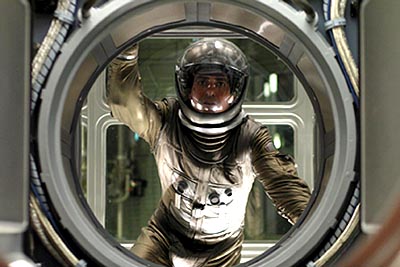

|
5 out of 10 |
 |
|
Kermit On An Isolated Space Station Based on the 1961 sci-fi novel by Polish writer Stanislaw Lem, Solaris was first adapted to film in 1972 by director Andrei Tarkovsky, for the Soviet Union. This new remake by American director Steven Soderburgh ("Ocean's Eleven," "Erin Brockovitch"). is again set on Prometheus, an isolated space station and features George Clooney, Natascha McElhone, Jeremy Davies and Ulrich Tukur. After secretly studying a strange spacial phenomenon which allows their memories to come to life, the crew have mysteriously cut off all communications with Earth. Psychologist Chris Kelvin (George Clooney) recovering from his wife's (Irish actress Natascha McElhone) recent death, is invited to the station by close friend and crew member Gibarian (Ulrich Tukur). When Kelvin arrives he finds Gibarian has committed suicide and the remaining scientists are in a state of extreme anxiety and stress. He suddenly begins to suffer from the phenomenon himself and meets his wife on board, finding he has a chance to re-examine his guilt over her death and rekindle a relationship. Will he really be able to resolve the past or is he just escaping further from reality? With a thought-provoking storyline, this gripping psychological thriller is a visually impressive adaptation. The novel, described by Lem as "the problem of encountering a entity in space which is neither human or humanoid…something that certainly exists, but cannot be reduced to human concepts or ideas," the atmosphere of mystery and seduction of the unknown explored by the author is captured perfectly. From the costumes to the sets, Sonderburgh and his production crew, effectively recreate the feel of a sterile space station and Earth of the future and through the relationship between of Clooney and McElhone, recreate their tormented love story set in space. Known for her performances in "Ronin," "Devil's Own" and most recently "Ladies in Lavender," McElchone is an ideal selection for the intelligent but vulnerable Rheya, in both human and ethereal form and gives a stark and heartbreaking performance. Clooney, however, is more ill-suited to his large role. Originally hoping for Daniel Day Lewis, Clooney, who looked like a MUPPET throughout, lacked the depth and personality to carry the psychological weight of the story well and at times his performance was so flat and reminiscent of Dr. Ross from ER that one could not sympathise with his character. His rather hamfisted performance is only outdone by Jeremy Davies, who plays crew member Snow like Dean Haglund out of "The X-Files." One of the most interesting aspects of the production is Sonderburg's desire to create a more experimental piece. Varying camera shots and lenses to distinguish between flashbacks and current time, he gives many scenes a déjà vu feel, which although sometimes confusing, adds an elegance and soul which gives the film a life and presence of its own. The intensive detail and planning on the costumes and design of Promethus (based on the International Space Station) down to the personal possessions of the crew, by the visual effects and production team, help to give an atmosphere which is impressive even when the performances are sometimes lacking. While looking beautiful and being one of the most intriguing science fiction stories to hit theatres in awhile, with lack of a strong supporting cast, Solaris at times seems empty and overly centred on Clooney, which leads the film to feel like mainstream MTV, all glamour and no substance, souring a cult classic.
Film Critic: Jennifer M Lillies |
|